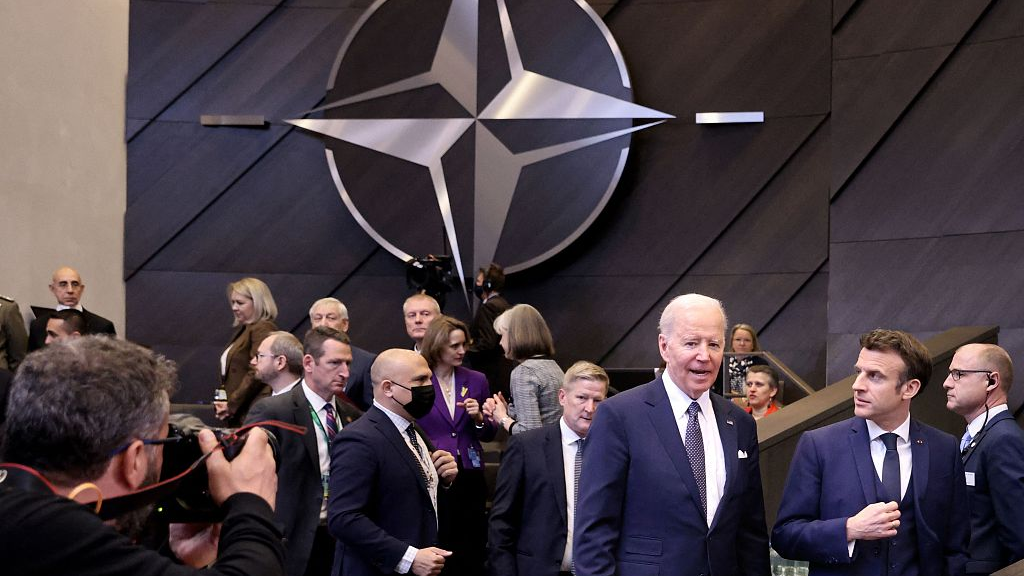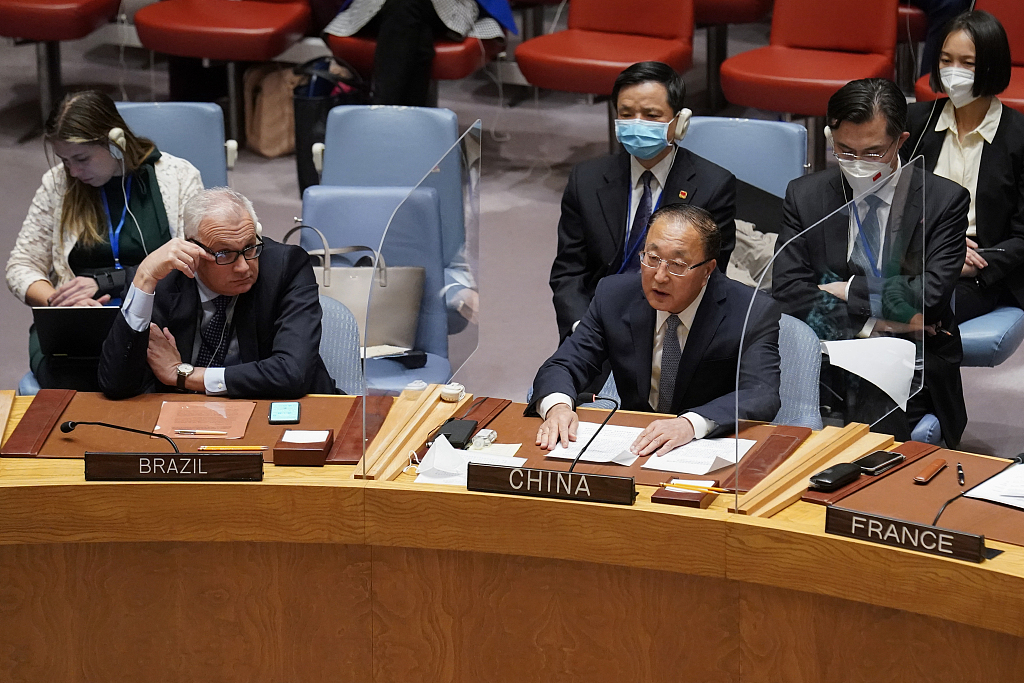
U.S. President Joe Biden (L) talks with French President Emmanuel Macron as they attend a North Atlantic Council meeting during a NATO summit at NATO headquarters in Brussels, Belgium, March 24, 2022. /VCG
U.S. President Joe Biden (L) talks with French President Emmanuel Macron as they attend a North Atlantic Council meeting during a NATO summit at NATO headquarters in Brussels, Belgium, March 24, 2022. /VCG
Editor's note: Bradley Blankenship is a Prague-based American journalist, political analyst and freelance reporter. The article reflects the author's opinions and not necessarily the views of CGTN.
In the Extraordinary Summit of North Atlantic Treaty Organization (NATO) Heads of State and Government on March 24, Western leaders demonstrated what is being reported by Reuters as "a show of Western unity" in response to Russia's "special military operation" in Ukraine.
Countries within this bloc announced another round of sanctions against top Russian officials, bolstering NATO's eastern front by around 40,000 troops and, according to Politico, sending "advanced weapons" to Ukraine, such as drones and anti-tank missiles, which has increased the member countries' defense spending – a topic expected to be raised in June at the bloc's major summit, in which its Strategic Concept document will be drafted.
Rhetorically, following the summit, NATO released a joint statement that was unequivocal in its condemnation of Russia and its military operation. However, its mention of China was a step too far – and showed that NATO is confusing Western unity with global unity, which is very different.
The statement said, "We call on all states, including the People's Republic of China (PRC), to uphold the international order including the principles of sovereignty and territorial integrity, as enshrined in the UN Charter, to abstain from supporting Russia's war effort in any way, and to refrain from any action that helps Russia circumvent sanctions."
Specifically, the statement says that NATO members "are concerned by recent public comments by PRC officials and call on China to cease amplifying the Kremlin's false narratives, in particular on the war and on NATO, and to promote a peaceful resolution to the conflict."
There are two issues here. First, China is not materially supporting Russia's military operation and reports that suggest this are completely false. China is engaging in ordinary commerce with Russia – but so are a vast majority of other countries in the world. This is because the West-led sanctions against Russia are not rooted in international law, or organized by existing multilateral institutions, but, on the contrary, illegal under international law.
China, and any other country in the world for that matter, is under no legal or moral obligation to comply with West-led sanctions aimed at imposing American hegemony and constantly expose themselves as harmful to innocent people.
The sanctions against Russia are said to be meant to change the state's behavior, but this has clearly never been the case with Western sanctions. They're meant to harm innocent people and disrupt civil society. For the developing world, these sanctions would also deal a harmful blow to their respective development – and we can see even in rich countries that the sanctions are having a blowback effect that particularly impacts the poorest.
Second, on comments from PRC officials with regards to the conflict and NATO's role, China is within its rights to speak the truth about this war. PRC officials and Chinese media are exposing the fact that the West is primarily responsible for diplomatic breakdowns that directly led to this conflict and that NATO expansion played a major role, considering it was one of Russia's primary security concerns.

Zhang Jun, ambassador of China to the United Nations, speaks during a meeting of the UN Security Council at UN headquarters, March 23, 2022. /VCG
Zhang Jun, ambassador of China to the United Nations, speaks during a meeting of the UN Security Council at UN headquarters, March 23, 2022. /VCG
This is not disinformation. These are facts that have been discussed openly even by the West's top experts on Russia and European policy. We are talking about people like Henry Kissinger, George Kennan, Stephen Cohen, John Mearsheimer, Jeffrey Sachs and Noam Chomsky – very mainstream names in the field of international relations.
If we have reached a point in Western society that high-quality political analysis by our own top experts is shunned as opposing propaganda, then that speaks more than anything to our fundamental decline as a society.
Finding a peaceful resolution to this conflict, and making sure that ones like it never emerge again, means that we must be able to have difficult conversations about the effectiveness of our policies and whether they are achieving desired results. Clearly, the existing security architecture of Europe, based on NATO, which necessarily means butting Russia out of the conversation, has failed – that is, if peace and security is the end goal.
Logically, it can only mean that we must adopt another approach. But this requires thoughtful debate which will be impossible if any critical analysis is thrown out of the window and dismissed as enemy propaganda. The West has to do better than this to ensure Europe and the world's security.
On the other hand, China is staking out a principled position based on peace on the Ukraine issue precisely because it is not imposing coercive sanctions, which never work, and is honestly examining the antecedent causes of the conflict while urging diplomacy first.
The difference couldn't be clearer between who really wants peace and who doesn't, since one side is openly and proudly sending weapons and the other is leading diplomacy. What more is there to say?
(If you want to contribute and have specific expertise, please contact us at opinions@cgtn.com. Follow @thouse_opinions on Twitter to discover the latest commentaries on CGTN Opinion Section.)

